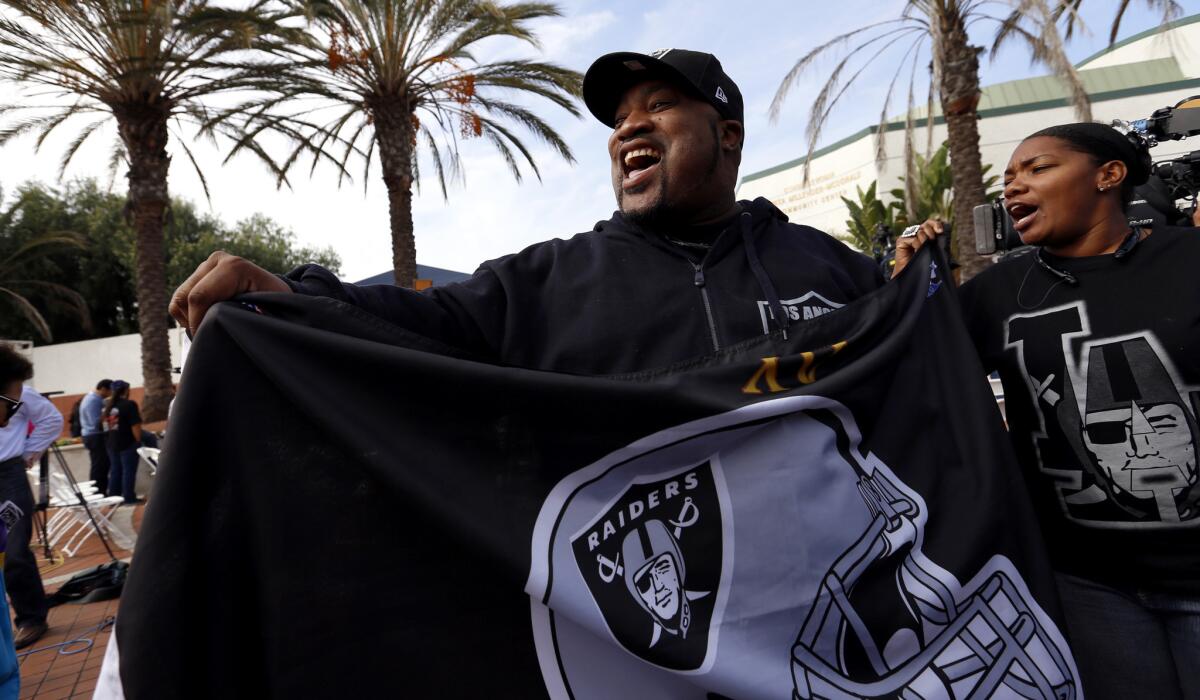NFL’s return to L.A. sparks peak optimism amid latest developments

The day after startling news the San Diego Chargers and Oakland Raiders plan to build a stadium to share in Carson, the Los Angeles area appeared to be in its best position in years to finally end the NFL’s two-decade absence.
“I think it’s happening much sooner than later,” said Amy Trask, the Raiders’ chief executive from 1997 to 2003. “I would be surprised, very surprised, at this point if there’s not an announcement made to have a team or teams back in the market in a temporary location by the 2016 season.”
The $1.7-billion project on the site of a former landfill joins a proposal by a group that includes St. Louis Rams owner Stan Kroenke’s for a stadium at the old Hollywood Park racetrack in Inglewood. There are also long-running plans by separate groups for venues in downtown L.A. and the City of Industry.
“The probability of a team coming to Los Angeles in the near term is actually quite high,” said Marc Ganis, a Chicago-based sports consultant who helped the Raiders and Rams leave L.A. in 1995.
Failed plans and missed opportunities to bring professional football back to the region have been around for 20 years. But a sense of inevitability now surrounds the NFL’s return as multiple privately financed projects compete to lure the country’s most popular sport.
That optimism extended to a community center in Carson that played host to a news conference about the stadium project Friday. The hour-long event seemed, at times, like a small-town pep rally. A small church choir opened by singing the national anthem. A child then led the hundreds of boisterous attendees in the Pledge of Allegiance.
No representative from the Chargers or Raiders showed up. But enthusiasm surged through a string of speeches by local politicians and civic leaders.
“Let’s make some noise!” Carson Councilwoman Lula Davis-Holmes shouted. “Are you as excited as I am? This is a history-making moment for us. Carson, yes we can.”
Some supporters carried signs that read “I’m on Carson’s team.” A group of Raiders fans chanted, “Bring ‘em back.”
San Diego and Oakland didn’t share the same excitement. At an impromptu news conference outside police headquarters in San Diego on Friday, Mayor Kevin Faulconer blasted the Chargers.
“The Chargers weren’t being up front with San Diegans, they weren’t being up front with their fans, they weren’t interested in working together,” said Faulconer, visibly upset.
The team has unsuccessfully sought a new stadium in San Diego for 14 years. Last month, the city established a nine-member committee to study potential locations and financing for a stadium project.
Much of the civic vitriol targeted Mark Fabiani, the Chargers’ special counsel for stadium issues. George Mitrovich, president of the City Club of San Diego, said Faulconer should be asked whether Fabiani is “duplicitous, deceitful and deceiving.”
Fabiani dismissed the criticism.
“We are going to continue to work in our home markets on one track while developing another option in the event we fail in our home markets,” he said.
Meanwhile, Oakland reacted with a mixture of dismay, urgency and even optimism that plans for a new stadium complex to house the Raiders and Athletics at the existing O.co Coliseum site would now be accelerated.
“There’s a fire that needs to be lit under both the city of Oakland and the county,” said Oakland Councilman Larry Reid, who was elected chairman Friday of the authority that operates the coliseum site.
The plan, which includes housing, retail and hotels, would cost more than $2 billion. An investor group headed by San Diego-based Renaissance Companies Chairman Floyd Kephart is negotiating the deal with Oakland.
“The Raiders will tell you that they’re about 90% there with Mr. Kephart and we just need the county to decide whether or not they’re committed,” Reid said.
Alameda County Supervisor Scott Haggerty said Raiders owner Mark Davis assured him Oakland remains his first priority, but “doesn’t fault the Raiders at any level for making sure they have a plan B.”
But specifics about the Carson project that would build the NFL’s most expensive stadium were in short supply Friday. It’s the same site entertainment mogul Michael Ovtiz promoted in the late 1990s for a development called the “Hacienda” that included a stadium and a shopping mall. That ended when the NFL awarded the league’s 32nd franchise to Houston over competing groups in the L.A. area.
The Raiders and Chargers pledge no new taxes or money from the city budget will finance the plan. Instead, they want to use the model that allowed the San Francisco 49ers to move into the $1.2-billion Levi’s Stadium in Santa Clara last year.
The 49ers and city officials created a new public agency, the Santa Clara Stadium Authority, which is made up of City Council members. It took out $621 million in construction loans — to be paid back with revenue generated by the stadium and naming rights — and raised $312 million selling personal seat licenses to season-ticket holders. Other funds came from the team and NFL, Santa Clara’s redevelopment agency and a new hotel tax.
“Taxpayers and the general fund will be isolated and protected,” said Tim Romer, a managing director for municipal finance at Goldman Sachs and advisor to the Chargers. “It’ll be financed solely by revenues generated by the stadium.”
But Neil deMause, editor of Field of Schemes, a website that tracks stadium subsidies, described the project as “completely screwy” and is skeptical the teams will be able to pay for the stadium.
“This seems extremely dubious,” he said. “That’s a crazy amount of money.”
Others disagree.
“That project has a great chance of success,” said Ganis, the sports consultant, who thinks the teams will be able to attract ample financing. “It solves a whole host of problems without creating any.”
Carson2gether, the community organization working to bring the teams to the city, plans to gather signatures for a ballot measure to move forward with the project. They are unsure when they will start collecting signatures or if the measure will go to Carson’s City Council or the voters.
The Hollywood Park project has a head start. Inglewood’s City Council could approve a ballot measure for their stadium at a meeting Tuesday. Developers hope to break ground late this year.
Inglewood city officials and the Hollywood Park developers declined comment.
Trask, the former Raiders executive, is familiar with the potential stadium sites. None are going to be perfect, she said. But the developments in L.A. over the last year have left her with a growing sense the NFL’s return is approaching.
“It’s a high-stakes game of musical chairs,” she said. “At some point, the music stops and someone is left without a chair. Only in this case, the stakes are much higher.”
Times staff writers Sam Farmer, Tony Perry and Lee Romney contributed to this report.
Twitter: @nathanfenno
More to Read
Go beyond the scoreboard
Get the latest on L.A.'s teams in the daily Sports Report newsletter.
You may occasionally receive promotional content from the Los Angeles Times.













